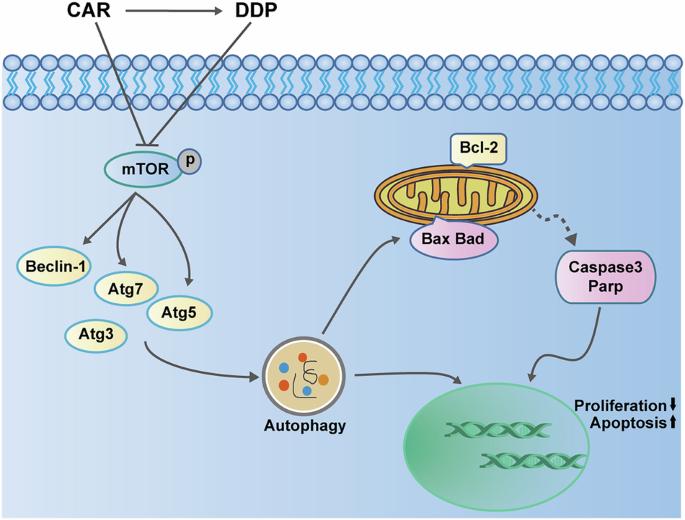Cardamom synergizes with cisplatin against human osteosarcoma cells by mTOR-mediated autophagy
IF 5
3区 医学
Q1 BIOTECHNOLOGY & APPLIED MICROBIOLOGY
引用次数: 0
Abstract
Cisplatin (DDP), a frontline chemotherapeutic agent in osteosarcoma (OS) treatment, is frequently paired with other compounds to enhance its therapeutic potency. Cardamom (CAR), a natural flavonoid, exhibits significant inhibitory effects on human OS cells while minimizing toxic side effects. In this study, we combined CAR and DDP to treat OS, revealing that the DDP/CAR combination synergistically inhibits the growth of human OS cells in vitro and in vivo. Network pharmacological analysis indicated that mammalian target of rapamycin (mTOR) may be an important cross-target for DDP/CAR combination. Notably, this combined treatment significantly reduced mTOR phosphorylation and elevated autophagy levels within OS cells. At the mechanistic level, the DDP/CAR regimen enhanced apoptosis and compromised the viability of OS cells by triggering autophagy. This impact was attenuated by the use of the mTOR activator MHY and the autophagy inhibitor hydroxychloroquine (HCQ). Furthermore, in DDP-resistant cell lines, CAR was able to mitigate DDP resistance by bolstering autophagy levels. In general, our results suggest that CAR bolstering autophagy levels DDP against OS cells through the induction of mTOR-mediated autophagy.

豆蔻与顺铂协同作用,通过mtor介导的自噬作用对抗人骨肉瘤细胞。
顺铂(DDP)是骨肉瘤(OS)治疗的一线化疗药物,经常与其他化合物配对以增强其治疗效力。Cardamom (CAR)是一种天然类黄酮,对人类OS细胞具有显著的抑制作用,同时毒副作用最小。在本研究中,我们将CAR和DDP联合治疗OS,发现DDP/CAR联合在体外和体内协同抑制人类OS细胞的生长。网络药理学分析表明,哺乳动物雷帕霉素靶点(mTOR)可能是DDP/CAR联合的重要交叉靶点。值得注意的是,这种联合治疗显著降低了骨肉瘤细胞中mTOR磷酸化和升高的自噬水平。在机制水平上,DDP/CAR方案通过触发自噬来增强细胞凋亡并损害OS细胞的活力。使用mTOR激活剂MHY和自噬抑制剂羟氯喹(HCQ)可以减轻这种影响。此外,在DDP抗性细胞系中,CAR能够通过增强自噬水平来减轻DDP抗性。总的来说,我们的研究结果表明,CAR通过诱导mtor介导的自噬来增强对OS细胞的DDP自噬水平。
本文章由计算机程序翻译,如有差异,请以英文原文为准。
求助全文
约1分钟内获得全文
求助全文
来源期刊

Cancer gene therapy
医学-生物工程与应用微生物
CiteScore
10.20
自引率
0.00%
发文量
150
审稿时长
4-8 weeks
期刊介绍:
Cancer Gene Therapy is the essential gene and cellular therapy resource for cancer researchers and clinicians, keeping readers up to date with the latest developments in gene and cellular therapies for cancer. The journal publishes original laboratory and clinical research papers, case reports and review articles. Publication topics include RNAi approaches, drug resistance, hematopoietic progenitor cell gene transfer, cancer stem cells, cellular therapies, homologous recombination, ribozyme technology, antisense technology, tumor immunotherapy and tumor suppressors, translational research, cancer therapy, gene delivery systems (viral and non-viral), anti-gene therapy (antisense, siRNA & ribozymes), apoptosis; mechanisms and therapies, vaccine development, immunology and immunotherapy, DNA synthesis and repair.
Cancer Gene Therapy publishes the results of laboratory investigations, preclinical studies, and clinical trials in the field of gene transfer/gene therapy and cellular therapies as applied to cancer research. Types of articles published include original research articles; case reports; brief communications; review articles in the main fields of drug resistance/sensitivity, gene therapy, cellular therapy, tumor suppressor and anti-oncogene therapy, cytokine/tumor immunotherapy, etc.; industry perspectives; and letters to the editor.
 求助内容:
求助内容: 应助结果提醒方式:
应助结果提醒方式:


